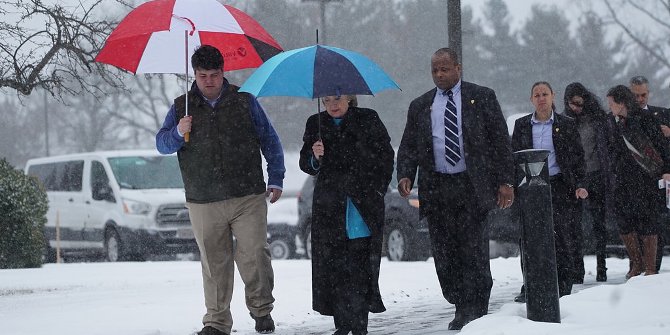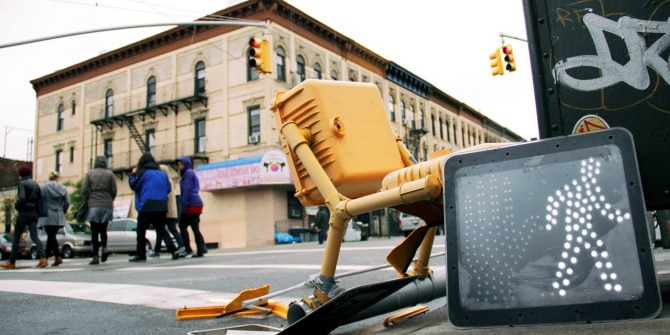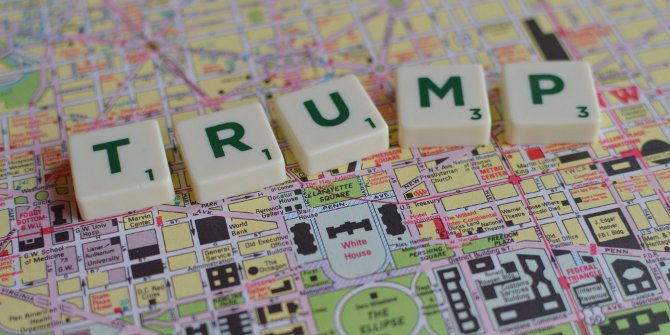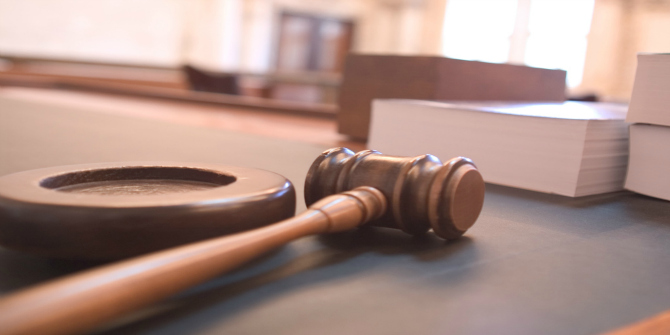 Voters in the Granite State go to the polls today in the first primary of the 2016 presidential season. US Centre Director, Peter Trubowitz writes that while Bernie Sanders and Donald Trump may lead the polls for the Democrats and the GOP, if they are able to win, the margin of their victories has big implications for how the rest of the race unfolds.
Voters in the Granite State go to the polls today in the first primary of the 2016 presidential season. US Centre Director, Peter Trubowitz writes that while Bernie Sanders and Donald Trump may lead the polls for the Democrats and the GOP, if they are able to win, the margin of their victories has big implications for how the rest of the race unfolds.
In the lead up to today’s New Hampshire primary, some pundits have been predicting that snow might have a big impact on turnout, while others are not so sure. This is no surprise; the New Hampshire primary is a veritable graveyard for such predictions. Time and time again, the voters in the Granite State have scrambled the presidential race. Often the winner in Iowa loses the following week in New Hampshire. It happened to Barack Obama in 2008; he beat Hilary Clinton in Iowa only to see her come back in New Hampshire. The same thing happened in 2012 on the Republican side. Mitt Romney lost to Rick Santorum, but came back strong in New Hampshire.
Much of this has to do with New Hampshire’s voting rules. Undeclared voters can vote in either the Republican or the Democratic primary. These voters often break late, strategically looking to see where their vote is likely to count the most. This year roughly 40 percent of New Hampshire voters are undeclared. That’s a large number and while many observers expect them to vote in the Republican primary, they might surprise us.
 Former Secretary of State Hillary Clinton in Manchester, New Hampshire Credit: Hillary for America (Flickr, CC-NC-2.0)
Former Secretary of State Hillary Clinton in Manchester, New Hampshire Credit: Hillary for America (Flickr, CC-NC-2.0)
Could Trump lose (again) in New Hampshire? What about Bernie Sanders?
Yes, anything is possible. Trump could lose; Sanders too. But right now Trump and Sanders are leading in all of the New Hampshire polls and if you had to bet, you’d bet on both of them to win. I think the more interesting questions are by how much and whether their victories will change the dynamics of the race.
On the Republican side, the key question is whether one of the moderate Governors — Kasich (Ohio), Bush (former, Florida) or Christie (New Jersey) — is able to beat expectations. Kasich is trending upward in most of the polls, so he may be the one to watch. On the Democratic side, Clinton is also closing the gap in the polls and if she comes close, it will breathe new life into her campaign as we move on to South Carolina, where the demographics are more favourable for her than for Sanders.
Will New Hampshire fundamentally alter the course of the presidential campaign?
Probably not. On the Republican side, I expect most of the candidates to hang in there until at least South Carolina and possibly, Super Tuesday in early March. Christie and Kasich are the most likely to exit, should they fail to meet or beat expectations today. On the Democratic side, Clinton and Sanders will soldier on, no matter who wins today. What could change the dynamic is if Trump’s vote evaporates or Clinton runs a distant second. A Trump loss would open things up for others, though it is not obvious who Trump supporters, many of whom are blue-collar, would line up behind. A poor showing by Clinton would raise anew questions about her viability in a party that has a strong progressive wing.
Please read our comments policy before commenting.
Note: This article gives the views of the author, and not the position of USAPP – American Politics and Policy, nor the London School of Economics.
Shortened URL for this post: http://bit.ly/1SdA4xZ
_________________________________
 Peter Trubowitz – LSE US Centre
Peter Trubowitz – LSE US Centre
Peter Trubowitz is Professor of International Relations, and Director of the LSE’s US Centre. His main research interests are in the fields of international security and comparative foreign policy, with special focus on American grand strategy and foreign policy. He also writes and comments frequently on U.S. party politics and elections and how they shape and are shaped by America’s changing place in the world.






